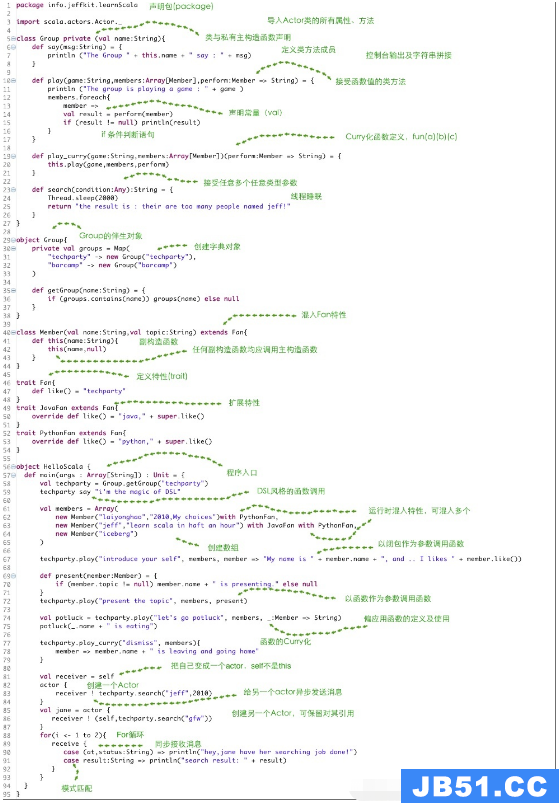我想了解
scala如何处理元组的排序和排序
例如,如果我有列表
val l = for {i <- 1 to 5} yield (-i,i*2)
Vector((-1,2),(-2,4),(-3,6),(-4,8),(-5,10))
scala知道如何排序:
l.sorted Vector((-5,10),(-1,2))
l.sortWith(_ < _) error: value < is not a member of (Int,Int) l.sortWith(_ < _)
scala如何知道如何排序这些元组?
解决方法
因为排序有一个隐含参数ord:
def sorted[B >: A](implicit ord: math.Ordering[B]): List[A] Sorts
this sequence according to an Ordering.The sort is stable. That is,elements that are equal (as determined by
lt) appear in the same order in the sorted sequence as in the
original.ord the ordering to be used to compare elements.
并且在scala.math.Ordering中定义了一个隐式转换:
implicit def Tuple2[T1,T2](implicit ord1: Ordering[T1],ord2: Ordering[T2]): Ordering[(T1,T2)]
所以l.sorted将被转换为l.sorted(scala.math.Ordering.Tuple2 [Int,Int]()).
测试:
scala> def catchOrd[A](xs: A)(implicit ord: math.Ordering[A]) = ord catchOrd: [A](xs: A)(implicit ord: scala.math.Ordering[A])scala.math.Ordering[A] scala> catchOrd((1,2)) res1: scala.math.Ordering[(Int,Int)] = scala.math.Ordering$$anon$11@11bbdc80
当然,您可以定义自己的订单:
scala> implicit object IntTupleOrd extends math.Ordering[(Int,Int)] {
| def compare(x: (Int,Int),y: (Int,Int)): Int = {
| println(s"Hi,I am here with x: $x,y: $y")
| val a = x._1*x._2
| val b = y._1*y._2
| if(a > b) 1 else if(a < b) -1 else 0
| }
| }
defined object IntTupleOrd
scala> Seq((1,(3,(2,3)).sorted
Hi,I am here with x: (1,y: (3,4)
Hi,I am here with x: (3,y: (2,3)
Hi,3)
res2: Seq[(Int,Int)] = List((2,3),(1,4))
编辑使Tuple [Int,Int]有一个简单的方法支持所有以下方法:< =,>> =.
scala> implicit def mkOps[A](x: A)(implicit ord: math.Ordering[A]): ord.Ops =
| ord.mkOrderingOps(x)
mkOps: [A](x: A)(implicit ord: scala.math.Ordering[A])ord.Ops
scala> (1,2) < (3,4)
res0: Boolean = true
scala> (1,2) <= (3,4)
res1: Boolean = true
scala> (1,2,3) <= (1,4)
res2: Boolean = true
scala> (3,3,3) >= (3,4)
res3: Boolean = false


